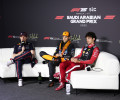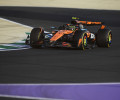2023 FIA Formula One World Championship Formula 1 Commission Meeting 21.02.23
The Formula 1 Commission held its first meeting of 2023 today, 21 February, in London ahead of the start of the new season. With the teams and drivers soon travelling to Bahrain for the Official Pre-Season Test and opening Grand Prix, the Commission discussed and approved the key regulatory changes to be deployed over the year ahead, with the meeting chaired by Formula 1 President and CEO Stefano Domenicali and newly-appointed FIA Single-Seater Director Nikolas Tombazis.

The following is an overview of the key discussion points and decisions.
Wet tyres and wet weather package
Following successful testing by Pirelli, with the support of teams, Pirelli have arrived at a wet weather tyre which is much more performant than the previous specification – this tyre does not require the use of tyre blankets.
The tyre construction will be available from the 2023 FIA Formula 1 Emilia Romagna Grand Prix.
The F1 Commission approved this change to the tyre specification.
Additionally, The FIA is grateful for the offers of support made by the teams for the wet weather package project, as presented in the last F1 Commission meeting. A Technical Directive is being prepared to allow teams to do such work outside the Aerodynamic Testing Restriction (ATR) limits and outside the cost cap. Track testing will be planned for the second or third quarter of 2023.
Radio messages between teams and drivers
The Commission approved the proposal to relax the regulation of radio messages to and from the Drivers at all times during a Competition.
Parc Fermé for events that include a Sprint session
In the context of reducing the current excessive workload on FIA technical staff and scrutineers during events that include a Sprint session, the Commission approved a revised Parc Fermé request acceptance policy, in which Sprint weekend Parc Fermé allows a greater scope to change components that are prone to getting damaged, and greater use of self-declared Parc Fermé forms. This will apply for the whole Parc Fermé period from when the car leaves for Qualifying on Friday to when the car starts the race. This will be implemented via a Technical Directive.
Circuit changes
The FIA confirmed various updates and changes to circuits for the coming season:
- Saudi Arabia – significant changes have been to improve visibility on corner entry wherever possible
- Azerbaijan – the track will be completely resurfaced
- Miami – the track will be completely resurfaced
- Zandvoort – space between the pit stop positions has increased by 1.5m
- Qatar – A new pit building and paddock infrastructure will be built
The FIA has analysed DRS zones for 2022 and some changes made for 2023 in order to either facilitate overtaking, or make it harder in certain circuits where it was deemed not to be enough of a challenge. These changes will be implemented in Bahrain, Jeddah, Melbourne, Baku and Miami, and involve the adjustment of detection and activation zones, and additionally in Melbourne the 4th activation zone will be reinstated.
Sporting, Technical and Financial regulations
Minor amendments to the 2023 Sporting, Technical and Financial Regulations were unanimously approved. These included the introduction of a winter shutdown period for both Competitors and PU Manufacturers, wording to ensure that shorter races have reduced points even if they don’t finish with a suspended race and wording to allow easier access to the factories for the FIA auditing team, in order to police the adherence of the teams and PU Manufacturers to the Financial Regulations, and to the Operational limitations of the technical and Sporting Regulations.
An increase of the cost cap adjustment for additional races above 21 was agreed from 1.2M$ to 1.8M$ per race on the basis that the trend of the additional races being added to the calendar has been towards fly-aways, which are more expensive.
Note that all regulatory changes are subject to approval by the World Motor Sport Council.

 Facebook
Facebook Twitter
Twitter






